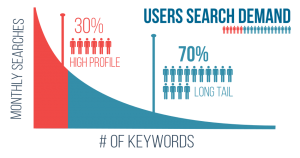A good keyword plan should be the first step in developing your content. Whether it’s content for your website, blog or social media a keyword plan provides the foundation. Without it you’re really going into your content creation blind and with little direction. So, it’s important to research and compile a list of keywords applicable to your audience and niche. But what exactly are keywords and why are they so important to your website? … Let’s start at the beginning.
What are keywords?
A keyword is any word or term a user may type into a search engine. Google, reportedly, processes 40,000 searches every second. That’s 40,000 keywords or phrases, any of which may be relevant to the goods or services you offer through your website. A good keyword strategy can help get your website in front of the people who are looking for it.
We can split these search terms into three major groups (possibly more, but let’s keep this simple for now). These groups are:
–Exact keywords
–Broad keywords
–Long tail keywords
The type of keyword a user uses can say a lot about what “stage” of the purchasing process they are in. Targeting the user at the right time along this process is the most effective way to yield results. Targeting the customer at the right time with the right content is vital to converting. Let’s take a look in a bit more detail:
Types of keyword
An exact keyword usually refers to a brand name, trademark or location. It’s something that the user would expect an exact return for. An example would be “The Grand Canyon”. If a user searches for this term it’s safe to assume they’re looking for information or pictures’ regarding The Grand Canyon in Arizona, USA and any other information is going to be irrelevant. They’re important for users looking for your website or company by name and it’s important that you’re ranking for these searches.
A broad keyword refers to search terms that could return a broader range of results. A good example of this might be “Motor insurance”. The user is likely to be in the “browsing phase” and currently collecting and comparing prices for motor insurance. But they may also be looking for information regarding the terms of their motor insurance, or may be looking to answer a query or question. These are the most competitive keywords as many websites will be relevant and looking to show for these broader terms.
A long tail keyword is the most specific of the search terms and usually consists of multi-word terms rather than single words. An example of a long tail keyword would be “Cheapest hairdresser in Chicago”. These are in many ways the most important keywords for your website. The user is most likely in the “buying phase” of the journey and looking for the specific product or service they require. If you are in fact a hairdresser in Chicago with very competitive prices, you’ll want to be top of the results page for this search term.

In the world of SEO good quality, relevant content is vital and understanding how customers find your content is just as important. By understanding keywords you’re on your way to understanding SEO as a whole. Not only that, but keyword research can help you to understand your audience and their searching habits a little better too. Harnessing them leads the way to creating relevant and entertaining content that your audience will enjoy. Once you understand your audience, you’ll understand the content they want to see.
Get in contact today if you want us to help put your website in front of the right customers.
